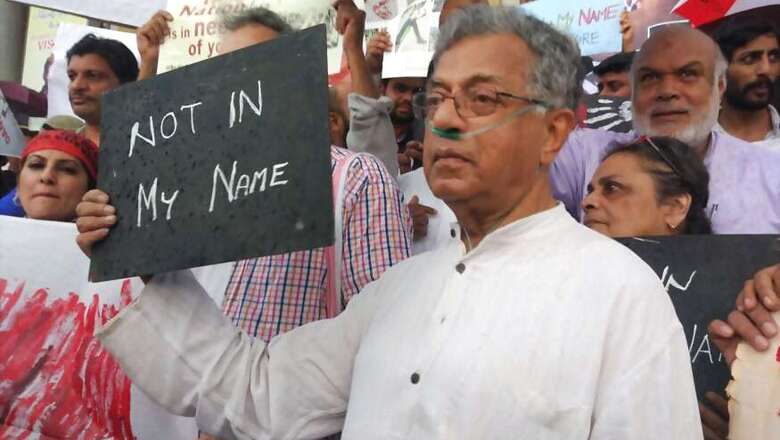
views
The 'Not in My Name' political brigade comprising of part-time campaigners, seasonal glamorous activists and hypocrite artists who have floated MaSuKa are being retweeted by the Congress-Communists Clandestine Combine in India. The petition addresses Prime Minister Congress-Communists bonhomie and calls for making a new law in the country. Very surreptitiously on charges of being selective, a paragraph on Bengal has been slipped in after social media protests.
First of all, it is queer to find that some of the erstwhile petition politicians who protested against Modi's democratic ascent to Delhi in 2014 referred to him as the Prime Minister. This acknowledgement of authority and not just power itself is a huge telling of the battles these activists chose to fight and lose – badly – on account of myopic political positioning.
Secondly, the classic and established laziness and refusal of the Congress-Communists Clandestine Combine in India to research before they demand a law or a new order is another dampener of the perpetrated movement. Anyone who values democracy, federalism and the Constitution in this country would know that law and order is a state subject. If the Union government decides on a law that ought to be made by states in the newly formed, democratically elected state legislatures, it would be booed down by another faction of the same selectively outraged and forever Modi baiters – the freedom of expression brigade – under the name of authoritarianism.
Thirdly, it is no rocket science for any conscientious citizen of India with ears and eyes on ground to understand that implementation of existing laws and not absence of new laws is a problem in this country. It would be puerile to imagine and advocate that bringing in new laws in India is going to solve issues.
Fourthly, this carefully crafted campaign by the Congress-Communists Clandestine Combine is a political tool that rides on MaSuKa. Bringing in a new law and then christening it with a Gandhi surname later is the tactic of the rotten communal Congress' political dispensation in this country. It does not matter to this party, who holds democracy at hostage, to consider that National Commission of Minorities has dismissed the import and implications of this unnecessary petition and MaSuKa.
My country is fascinating motley of various kinds of secularisms and freedom of expression brigades. I have maintained that the Congress-Communists Clandestine Combine in India has ensured the catatonic catastrophe of democracy and decency in this country.
The erstwhile organic 'Not in My Name' protest has been completely hijacked by the extremely political Tehseen Poonawallas and Shehla Rashids of the world. The online world where this petition politics plays out its cards has lost the moral credibility it embraced in its erstwhile organic texture. Just one look at who is retweeting whom and who is supporting whom reveals this orchestrated jugalbandi of petty petition politics.
But what is shocking is the absolute silence over Bengal in comparison to the clamor on Pahlu Khan and Junaid. What is also debilitating is the condescending dismissal of concerns for Human Rights in Bengal under the umbrella of derisive terminology - 'whataboutery' – when the intensity and absence of congruent outrage is called out for.
Politics is about asking the questions 'what about'. And dictatorship is about dismissing the questions in a way in which some questions become more important than others, in which some tears become saltier than others and in which some blood becomes more expensive than others. Often politics is not about the 'what', it is about the 'how'.
(The author is assistant editor, India Foundation Journal, and project head, northeast operations. Views expressed are personal)



















Comments
0 comment